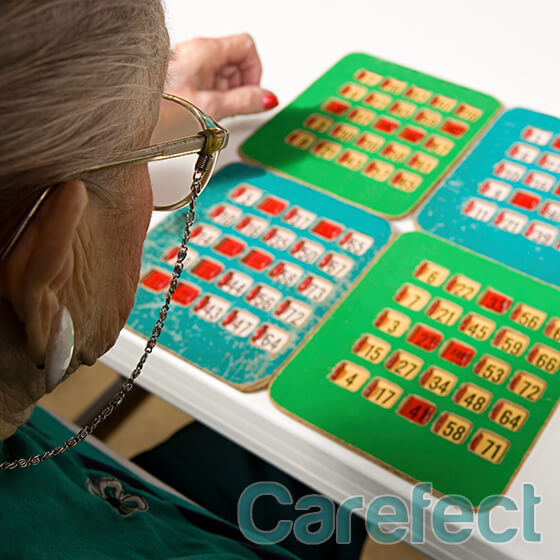Bingo is known to be a great party game for big groups and is well-loved by seniors and school age children alike, but did you know there are many health benefits to playing Bingo as well? In fact, Bingo can increase mental health, practice coordination and encourage opportunities for socializing for seniors.
Bingo Rules
Bingo is a game that is simple to learn and simple to adapt to different styles of play. Basic Bingo is a game in which you have a sheet with a table of blank squares where you can put numbers, pictures or words. Those numbers, pictures or words are put into a container and are drawn by the caller and the first person to get five in a row or diagonal is the winner. The best part of Bingo is you can do it with as simple as numbers and pictures or you can make it themed for holidays and celebrations. You can even get creative and make your own bingo games – one popular example is a ‘Life Experience Bingo’. Life experience Bingo encourages reminiscing because seniors can write down events or experiences in their life and put the paper in a container and for each experience pulled, those who share that experience can mark it off in their sheet. The first to have five in a row wins! But the real win is the memories you get to share with your friends and family. This encourages memory recall and communication skills which is a great exercise for the senior’s brain.
Benefits of Bingo
Cognitive Function
Bingo, like many board games, requires mental effort to learn rules and remember the gameplay. Mental effort in brain games increases cognitive function through consistent practice. The more challenging the board game, the more it will challenge their cognitive function and increase their mental stamina. However, challenging games can be taxing for seniors and Bingo is repetitive with easy rules so it is a great beginner game for those who want a fun and engaging activity. People who are authentically engaged are more likely to be invested in the game and will focus more on the task. This opens up their neural pathways for learning and increases their ability to recall information.
Social Engagement
Bingo, like most community based activities, is excellent for bringing people together and fostering healthy friendships. Seniors are more likely to suffer from isolation, and in recent years this is more true than ever. Every year the chance of their friends and family moving away or passing away increases. This makes it hard to retain friends and it can be challenging to be motivated to leave the house to make new friends. Being a part of their communities and social activities is critical for their emotional wellbeing. The benefit of a scheduled game that they can attend regularly is that it can be built into a routine. This encourages seniors to get outside, enjoy fresh air and meet new and familiar community friends. This regular socializing can decrease their chances of exacerbating mental illness. The risk of depression and anxiety increase with age, and mental illness thrives in loneliness and isolation. Bingo and community games combat that loneliness and increase community support.
Hand-Eye Coordination
Our dexterity and coordination can suffer as we age, so practicing activities that focus on hand-eye coordination can improve these skills. In Bingo, you must place the Bingo chips quickly and accurately in order to win, and this weekly practice improves hand-eye function. Practicing any movement such as flexibility, strength and hand-eye coordination can help improve a senior’s ability to complete household care tasks such as cooking and cleaning.
Bingo, like many other community games, is a great way to foster community friendships, improve emotional wellness and increase cognitive function. These health benefits are bonuses to an already fun and engaging pastime that is accessible to many seniors and provides opportunities to have a delightful time with their friends and family.
If you enjoyed this article, we also recommend these related posts in our Home Care Services blog:

